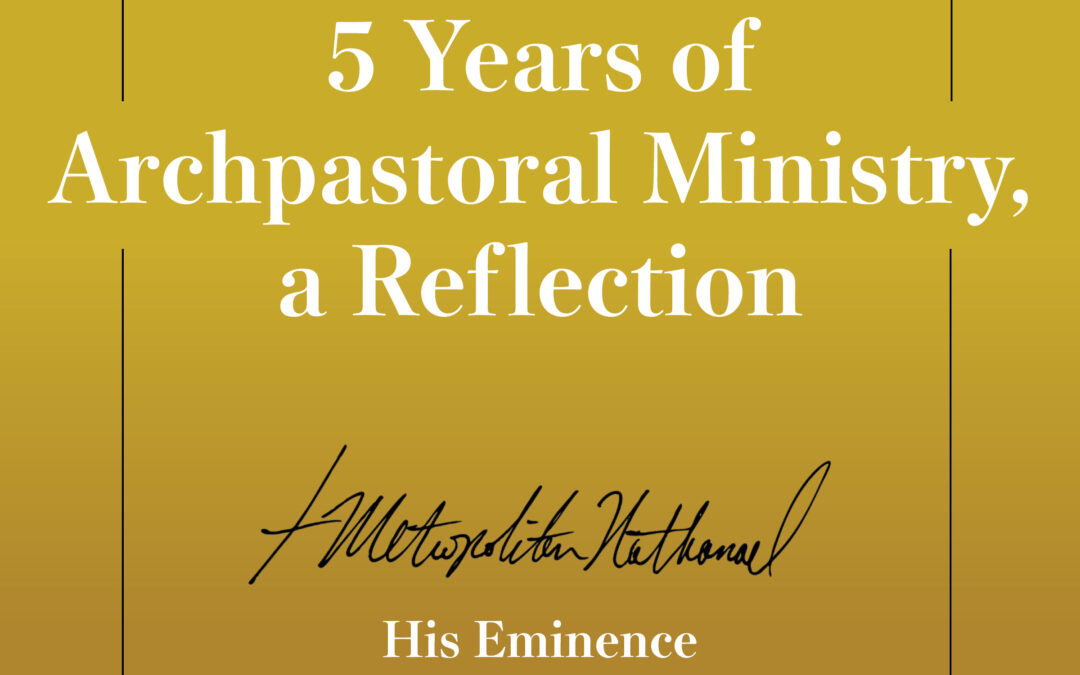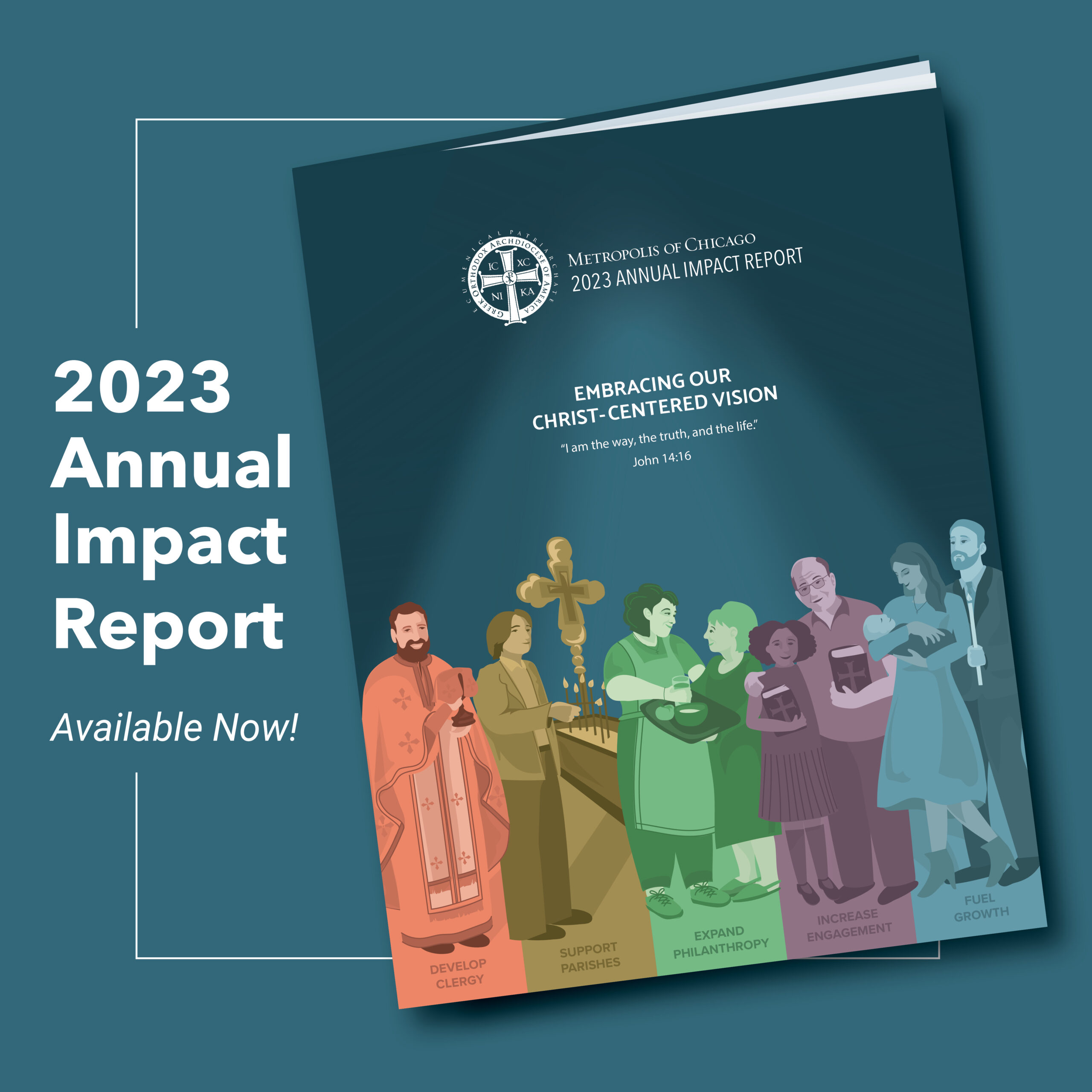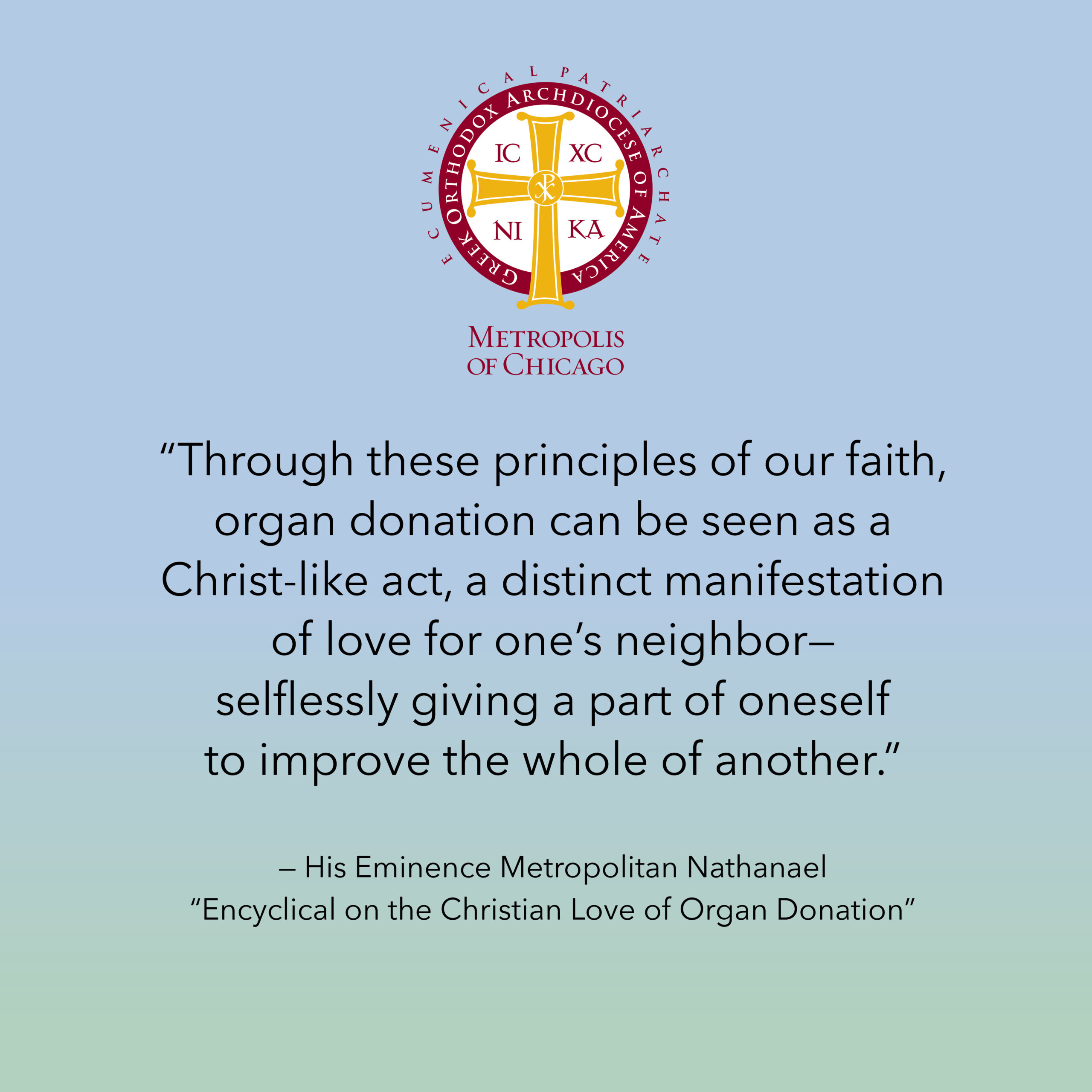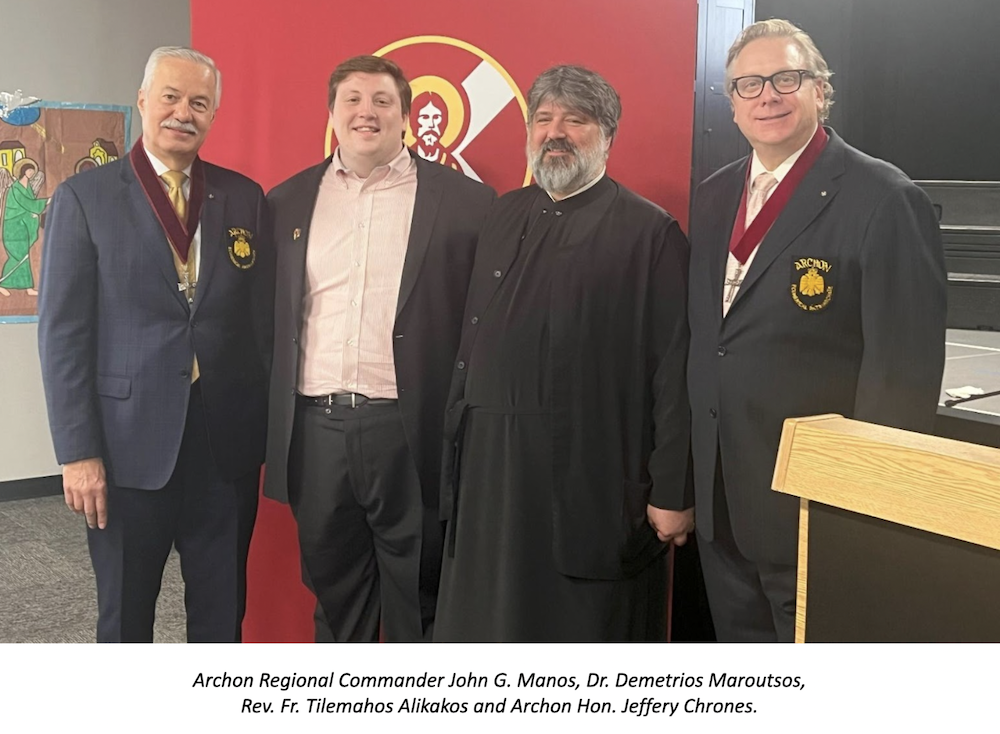
5 Years of Archpastoral Ministry, a Reflection
His Eminence Metropolitan NATHANAEL of Chicago
“Then Mary said, ‘Here I am, the servant of the Lord; let it be with me according to your word.’” (Luke 1:38)
Beloved brother Clergy, faithful Monastics, and blessed Laity of the Holy Metropolis of Chicago,
Saint Paul teaches that “all must test their own work” (Gal 6:4) and reminds us, “if those who are nothing think they are something, they deceive themselves” (Gal 6:3). Having reached the 5-year anniversary of my ministry as Metropolitan of Chicago, the wise words of King Solomon have remained at the front of my mind during these five years, “where there is no vision, the people perish” (Proverbs 29:18). Admittedly, though I have wrestled with the vision-casting process, it has provided the occasion to reflect on the past, acknowledge the present, and fashion the future. At this time, I recognize both the need to evaluate the work I have done alongside you during these five years and the need to remember my own ‘nothingness’ apart from God. With this mindset, and with immense gratitude for our Lord’s boundless mercy, I offer the following reflections with an eye toward our shared future.
As many of you know, my calling to ordained ministry is inseparable from my father’s final days of earthly life. The cancer within him was quickly bringing him toward death; however, there was another illness within him—the illness that inevitably takes over when a person’s heart is far from God. Then, an unexpected miracle occurred for our family. My father was healed! Shaken by a vivid dream of losing paradise, my father awoke, requested a visit from the local priest, received the Sacraments of Confession and Holy Communion, and—the next day—gave up his spirit. I say that my father “was healed” because he truly was. Cancer ended his physical life, but the divine gifts of confession and communion reconciled and united him to Christ, and this is the greatest healing and miracle that any of us can experience. Witnessing this firsthand opened my own heart to the transformative gift of confession and, ultimately, to discerning my calling to ordination and to sharing the evangelion of God’s mercy, love and healing with others.
The Feast of the Annunciation and Our Calling
Each year on March 24, the eve of the feast of the Evangelismos / Annunciation of the Most Holy Theotokos, we celebrate God’s entry into history as the Incarnate Word, Jesus Christ: “Today the Son of God becomes the Son of the Virgin and Gabriel announces the good news of grace! (Apolytikion of the Feast).
What joy! What an incomprehensible mystery! What amazing love God reveals! And how humbling it is for me to reflect on the correspondence of this great feast with the beginning of my diakonia within the Metropolis of Chicago on March 24, 2018. I am nothing; and yet, the Holy Synod of our Mother Church, the Ecumenical Patriarchate, entrusted me on this feast with your spiritual care. I am nothing; and yet, you have offered your continuous prayers commemorating me at our divine services; I am nothing, and yet, out of love for God and neighbor, you have collaborated with me with great faith, generosity, self-sacrifice, and determination.
In the Feast of the Annunciation, we celebrate not only God’s love and mercy in ‘descending’ and taking flesh from the Virgin Mary, but also Mary’s response to God’s love and mercy—her “here I am, the servant of the Lord; let it be with me according to your word” (Luke 1:38). The Annunciation is, therefore, the ultimate feast of “synergy,” of God and humanity acting together for the sake of our salvation.
Within our Orthodox Christian understanding of “synergy,” humanity and all creation cannot be saved from our predicament—from the raw reality of separation from God, brokenness, and death—without God’s initial action. God acts first by creating with a series of “Let there be…” commands and by willing to be in communion with all that He created. Throughout the Old Testament, God acts through the Law and the Prophets to establish a covenant and stay in communion with God’s people. In the Annunciation, which augurates the new covenant, God acts first by preparing the way for Mary and by sending the Archangel Gabriel to speak the Divine Will to her (Lk 1:26). But the event does not end here. Instead, in a manner that shatters our expectations, the Archangel and all the angels then wait; the fullness of creation waits; even God waits. For what? For the answer Mary will give to God’s invitation. [1]
St. Nicholas Cabasilas emphasizes the feast’s message of synergy and freedom, stating, “The Incarnation was not only the work of the Father, of His Power and His Spirit; it was also the work of the will and the faith of the Virgin” (On the Annunciation, 4). [2]
How beautiful and comforting it is to know that our Lord is not a tyrant but is a loving parent who neither abandons us nor forces His will upon us. And yet, God’s respect for our freedom means that we are responsible for doing our part in our salvation, and in bringing light and life to the world. As Orthodox, we are not passive recipients of God’s gift of salvation or mere spectators in the Divine drama; instead, our salvation depends upon our active participation in the life and ministry of the Church. God created the cosmos through a series of “Let there be…” commands; but God’s salvation of the cosmos comes only through Mary’s “Let it be” response. In this sense, all of us—clergy, monastics, and laity—are called to imitate the Theotokos and to say, ‘Here I am, the servant of the Lord; let it be with me according to your word’ (Luke 1:38).
The Role of the Archpriest
To reflect on my own response to God’s invitation, my own “let it be with me according to your word,” requires that I now examine myself as an archpriest. There is no archpriest, or bishop, who is not first a layman, then a deacon, and then a priest. Each of these orders of ordination carries with it a special charisma and responsibility within the life of the Church. The deacons’ primary role is to serve philanthropically (cf. Acts 6), visit and console the sick, and bring Holy Communion to those who cannot attend the Divine Liturgy. [3] Priests never relinquish their ordination as deacons, but their primary role now is to celebrate the divine services and the sacraments, and to be the spiritual leader of a local community when the bishop is not present. First, the priest is the one who prepares himself continuously, through prayer, fasting, and struggle against sin, to offer the ‘bloodless sacrifice’ of bread and wine “for the life of the world” (John 6:51). The priest also serves as the father and mentor to those entrusted to his care. He offers spiritual counsel and encouragement, teaches, and preaches the Gospel, and celebrates the holy sacraments for the healing and sanctification of the people of God. [4]
Bishops continue to be ordained both as deacons and as priests, engaging in philanthropy and celebrating the sacraments; however, the bishop’s primary role now is to teach and proclaim the Word, to communicate the Gospel to the faithful, and to ensure that the fullness of the faith is handed on authentically from generation to generation. Bishops also have the responsibility to gather in synod with other bishops, to discuss and resolve any challenges that arise within the life and teaching of the Church. [5] The local bishop also serves as the unifying presence and representative of the faithful in a particular geographical area, in a “local church.” He is the spiritual father to all the faithful within that local Church and, especially, to the priests and monastics serving in and leading the parishes and monasteries within his episcopal See. He ordains worthy candidates to the diaconate and priesthood, and tonsures readers, chanters, and monastics to fulfill their distinctive roles within the Church with his blessing.
Who could possibly fulfill such a calling faithfully? To be sure, I have experienced moments of deep self-doubt during these past five years, especially as we struggled to respond faithfully to a pandemic that has claimed more than 6 million lives worldwide—many of our family and friends. And yet, my heart has repeatedly been reassured and refilled with hope! This has occurred, first, by your zeal for Christ and love for the Church and, second, by recalling the words the Archangel Gabriel spoke to Mary, just before she accepted God’s invitation: “nothing will be impossible with God” (Luke 1:37). Yes, I am nothing; and yet, we, together, are the Body of Christ. I am nothing; and yet, nothing is impossible with God.
Reflecting on the Past
God’s loving collaboration with the local Greek Orthodox faithful has been evident since our first bishop, The Right Reverend Philaretos, began his ministry in Chicago in 1923, offering his “let it be with me according to your word.” From that time up to and including the 38 years of ministry offered by my beloved predecessor of blessed memory, Metropolitan Iakovos, our Metropolis developed and expanded to meet the needs of the people of God and to offer an Orthodox Christian witness in the broader community.
Our hierarchs oversaw construction of new parishes; cultivated clergy, monastic, and lay leadership vocations; established parochial and language schools; introduced camps and youth ministries; blessed monasteries; and—most importantly—invited all to experience God as Orthodox Christians, as members of the “One, Holy, Catholic, and Apostolic Church” (Nicene Creed). Such efforts bore much fruit, including the 58 parishes and 2 monasteries that currently comprise our Metropolis.
Inevitably, multiple external and internal challenges also impacted the witness and work of our local Greek Orthodox Church.
When I began my Archpastoral ministry five year ago, transparency, administrative integrity, communication, and vision needed to be among our top priorities. We immediately recruited new members and began regular meetings of the Metropolis Council; we conducted and shared the results of independent and full financial audits; we instituted governing policies to protect the integrity of the Church; we upgraded media and communication tools; and we completed an initial strategic planning process with wide-ranging participation.
Such early efforts helped our people renew their commitment to Christ, to their parishes, and to their neighbor.
Acknowledging the Present
While we have remedied many deficiencies of the past, we still have long-standing challenges lingering before us. As your Metropolitan for the past five years, I have experienced some of these challenges firsthand. They impact the overall dynamism of our Metropolis; however, they also have a negative effect on individuals and families. Acknowledging them, without placing blame, is the only way to establish a more dynamic Church community in the future. From my own limited vantage point, some of the most unsettling matters before us, include:
- Erroneous theological teachings and practices
- Limited engagement in parish and civic life
- Overwhelmed clergy and lay leaders
It should not surprise us that these challenges require us to focus on three main activities: teaching, philanthropy, and cultivating leaders, all of which parallel both Christ’s earthly ministry and the ministries of the deacon, the priest, and the bishop. [6]
As a way to eliminate fundamentalist teachings and practices, and as a way enhance our people’s participation in the Sacramental life of the Church, we have established, “Living Water Productions” and “Lighthouse.” Living Water is a multi-media educational platform that seeks to enhance the religious literacy of our people, while Lighthouse is new camping program that helps prepare high school graduates navigate the challenging waters of college.
As the Church of Christ, we embrace our calling to love our neighbor through prayer and acts of charity. We continue to collaborate with our long-standing Philoptochos Ministry, and we have developed new initiatives, such as Project HOPE, whose over 500 volunteers have, to date, provided close to 1,000,000 meals and secured more than 3,000 nights of housing for the homeless. [7]
Finally, now, more than ever before, we are determined to develop our lay and clergy leaders. Our efforts have included the formation of a Metropolis Junior Board, hosting a national retreat for deacons, developing a podcast for parish councils and ministry leaders, “Called to Lead,” and recognizing the extraordinary contributions of parishioners with the Bronze Cross of the Metropolis for their “Servant Leadership.”
Beloved collaborators, it is these three areas—teaching, philanthropy, and cultivating leaders—that especially merit our unwavering efforts as we walk, together and full of hope, into the future, and as we speak the words taught to us by the Theotokos, “here I am, the servant of the Lord; let it be with me according to your word.”
Fashioning the Future
In reflection to King Solomon’s words, “where there is no vision, the people perish” (Proverbs 29:18), I recognize that vision is not the responsibility of the hierarch alone. It requires enlisting others who will help to build a shared view of the future. For this reason, I began my Archpastoral ministry with a “Listening Tour” and continue to depend upon our clergy, Metropolis Council, young adults, and parish lay leaders to help construct a vision that is both authentically Orthodox and responsive to the landscape of our society.
At our upcoming Metropolis of Chicago Clergy-Laity Assembly in the Fall 2023, I will share details of a long-term vision for our Metropolis, which is actively being shaped by the stakeholders—clergy and laity—of our community. This vision is meant to serve as a compass that will direct our efforts toward a more vibrant future.
Over the next 25 years, we will establish a Metropolis that offers Christ’s love unconditionally to all people; a most vibrant clergy brotherhood that inspires the multitudes to pursue ordained and lay vocations; a Christian community whose understanding and appreciation of the faith leads to greater engagement in the sacramental life of the Church and in the life of society.
My beloved friends,
I close with a sense of inexpressible gratitude to God and to each of you for the love offered so generously to me, despite my nothingness. If you will continue to walk with me, offering your own “here I am, the servant of the Lord; let it be with me according to your word,” I have every hope for the future of our Holy Metropolis of Chicago. May God be glorified in all we do!
1. Our liturgical hymns for the Feast of the Annunciation highlight Mary’s freedom. The hymns of the Canon, chanted during Orthros, take the form of a dialogue between the Archangel Gabriel and the Virgin Mary, and highlight her confusion, her embarrassment, her sense of unworthiness, her uncertainty about the authenticity of this invitation. All of this underscores our belief that God’s Incarnation, our Lord’s entry into human history as Jesus Christ, truly hinged upon Mary’s decision.
2. The early Christian document, Letter to Diognetus, communicates the same point, “God persuades. He does not compel; for violence is foreign to Him.” Similarly, Saint Porphyrios writes, “Christ stands outside the door of our soul and knocks for us to open to Him, but He doesn’t enter. He doesn’t want to violate the freedom which He Himself gave us. The Book of Revelation says this in so many words: ‘Behold, I stand at the door and knock. If anyone will hear my voice and open the door, I will come into him, and I will dine with him, and he with me’ (Rev 3:20). Christ is courteous. He stands outside the door of our soul and knocks gently. If we open to Him, He will enter us and give us everything—Himself—secretly and silently.” (Wounded by Love, 109)
3. This is also why deacons are ordained during the Divine Liturgy after the Holy Gifts have been consecrated, since they offer the gifts that have already been prepared by a bishop or priest.
4. St. John Chrysostom writes, “Reflect on the great role of the priests! Consider the holy Baptism, the forgiveness of sins, the adoption, the Mysteries, the myriads of blessings, which come upon you by the ordination of priests and the supplicatory prayers they invoke” (Homily on Romans, 11). This is also why priests are ordained during the Divine Liturgy after the Great Entrance and prior to the consecration of the Holy Gifts, indicating that their focus is to be upon offering the Eucharistic sacrifice and other sanctifying sacraments for the faithful.
5. This is why a bishop is ordained during the Divine Liturgy prior to the Epistle and Gospel readings, signifying his primary role as a teacher and defender of the faith. The great hierarch and wonderworker, Saint Nectarios, writes that since a bishop must “respond adequately to the multifaceted questions and issues that will be submitted to him for consideration and resolution…he must be above all an excellent theologian and a profoundly spiritual man of prayer” (Habitation of Holiness, 142).
6. First, it is striking that even as the Incarnate Logos, “true God of true God,” Christ dedicated Himself to cultivating His interior life through prayer and fasting. He spent 40 days praying and fasting at the start of His public ministry (Matt 4:1-2); He prayed all night before selecting his apostles (Luke 6:12); He retreated in prayer after feeding the multitude with five loaves and two fish (Matt 14:23, Mark 6:46); He ascended Mount Tabor to pray before His Transfiguration (Luke 9:28); and he poured out his heart in prayer before his betrayal (John 17, Matt 26, Mark 14, Luke 22). For this reason, the deacon, priest, and bishop must remain intensely dedicated to the interior life. Imitating Christ’s perfect example, we must prioritize praying, fasting, going to confession, and deepening our knowledge of the faith through personal study. Having set this interior foundation for ministry, we can offer ourselves in service to others. Looking again to Christ’s example, we see that our Lord dedicated Himself primarily to three ‘outward-facing’ activities: teaching, philanthropy, and cultivating disciples as Church leaders.
7. St. Maria of Paris reminds us, “At the Last Judgment I will not be asked whether I satisfactorily practiced asceticism, nor how many prostrations and bows I have made before the holy table. I will be asked whether I fed the hungry, clothed the naked, visited the sick and the prisoner in jail. That is all I will be asked.”




